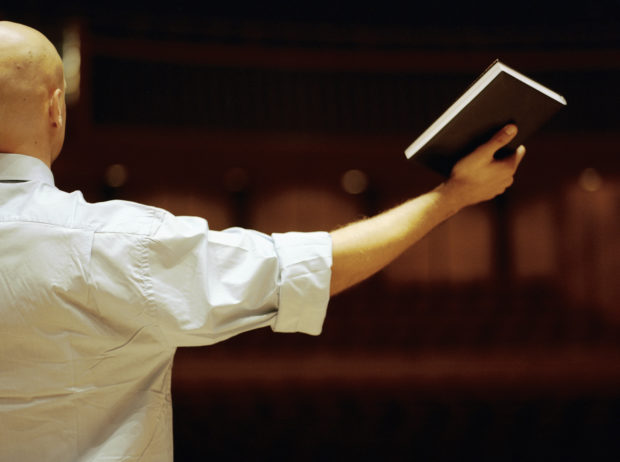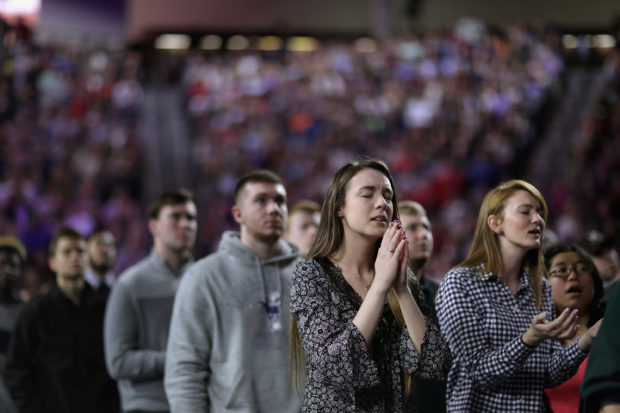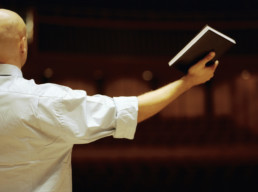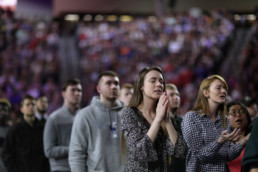Sometimes the Body of Christ is a Chocolate Chip Pancake
Sometimes the Body of Christ is a Chocolate Chip Pancake
Madeline Simpson | mms2331@columbia.edu

Associate Pastor David Gungor opens Trinity Grace Church’s service with worship songs. He plays an acoustic guitar, his wife plays the violin, and three other people sing harmony. They all stand at least six feet apart from each other.
After worship, Pastor Michael Rudzena enters the stage and gives a sermon about the biblical character Lazarus, who Jesus raised from the dead. Rudzena speaks of Jesus’ intellectual depth, his emotional intelligence and his hopeful courage as he learns about and mourns his friend’s death. Rudzena addresses an empty chapel.
The service flows from sermon to Eucharist, the Christian tradition of eating bread and drinking wine to honor Jesus’ body and blood. On a typical Sunday, the congregation would approach the front of the church to receive Eucharist from the pastor or church member.
But I know that today is different. I am not in Good Shepherd Chapel, where Trinity Grace holds service—I’m in my parent’s living room in White Bear Lake, Minnesota, watching Rudzena on a flat-screen TV. Instead of wine and bread, I have coffee and a piece of a chocolate chip pancake.
“Last week we said this is the weirdest Eucharist we’ve ever done,” Rudzena says. “But here we are again. Communion is about our connection to each other. Though we are not in the same room, we are deeply connected, not only by God’s spirit but by our love for each other.”
Trinity Grace is one of thousands of houses of worship in the United States and around the world impacted by the coronavirus. On March 21, the White House issued an ordinance for Americans to avoid gatherings of 10 or more people. Most evangelical church services fall in this category, and churches around the nation scrambled to set up technology that would allow the community to continue to meet.
It is the second Sunday in a row that I am attending “virtual church”—a result of social distancing and the “stay-at-home” orders to protect from the COVID-19 virus. The service is aired live on Trinity Grace’s YouTube channel, with a chat capability where congregants can talk in real-time throughout the sermon. I learn that I am not the only one watching out of town.
“Greetings from Baltimore!”
“Hello from two blocks away in Tribeca!”
“Grace and peace, everybody.”
For my church-going family, spending a Sunday morning at home usually meant a snowstorm had shut roads down. Raised in a conservative evangelical home, I grew up going to church a few times a week, including every Sunday morning. Skipping church was not allowed.
But now, we have no choice. My parents’ local church in Minnesota closed in the same way that the churches in New York did. There is nowhere to go on Sunday mornings except YouTube.
We adjust as the world adjusts.
“Let’s let this table move us towards unity in a time of strife,” Rudzena says, leading the online congregation in the Eucharist liturgy. “Let’s join in prayer, and start with gratitude. The Lord is here. His Spirit is with us... We lift our hearts to the Lord… It is right to give thanks and praise.”
And then, around the country, we eat our chocolate chip pancake, our cracker, our sourdough bread, and drink our wine, our coffee, our juice. We recite, separately but together, “Jesus Christ is holy. Jesus Christ is Lord. To the glory of God the Father. Amen.”
Hillsong's Carl Lentz Can't Keep God to Himself
Hillsong's Carl Lentz Can't Keep God to Himself
Madeline Simpson | mms2331@columbia.edu

Carl Lentz enters the stage of Hillsong NYC in the middle of a worship song.
In a light-wash denim button-down and black skin-tight jeans, he worships onstage. He stands behind the worship leaders and raises his hands, his body almost convulsing with the rhythm as he dances and sings. He wears a few silver necklaces (one with a cross dangling from it) and a red bracelet.
When the music fades, he breaks through the line of musicians in front of him and shouts with a slight southern twang.
“Come on! God is good! If you believe that, raise your voices!”
The crowd roars in response. He steps back behind the musicians and the music continues.
Lentz is a celebrity pastor. His Instagram page boasts a blue checkmark, a follower count of 642,000, pictures of his son hanging out with Justin Bieber and basketball games with rapper Drake.
Evangelical churches, especially evangelical megachurches, are often focused around a big personality who leads the church, teaching every Sunday. The sermons are typically based on Bible scripture and taught using engaging stories and analogies from the pastor’s own life.
When the music portion of the service comes to a close, Lentz takes center stage. He is alone, except for a musician who plays keys throughout the sermon (a low-level melodic hum) and two security guards who sit on the far right and far left mini-staircases leading to the stage.
Behind Lentz, a massive screen projects the words, “I Can’t Keep It to Myself” in neon blue cursive.
The pastor opens with a question to the thousands in the crowd: What can you not keep to yourself?
“If you know someone who is in love, if you know someone who is vegan, if you know someone who is a parent... they can’t keep it to themselves.”
Lentz launches into a story about his daughter’s dance recital, about how he could not sit quietly in his chair during the recital. About how he stood up and cheered for his daughter throughout the group performance.
Then, he directs the audience to a bible verse on the screen from the book of Philemon.
As he reads, the crowd responds.
“Come on, pastor.”
“Amen.”
“Really good.”
“That’s good, pastor.”
Some clap in response to Lentz. Some stand on their feet and shout encouragement at him.
When he says something moving and few respond, Lentz calls out the crowd.
“Come on, somebody! You can clap. Twenty other people did!”
The message is a tutorial on how to evangelize. Lentz begins by comparing a life with sharing the story of Christ (“impact on others” leading to “deeper revelation”) to a life without (“minimal impact” leading to “hollow religious patterns”). He talks about how his parents were part of the “Jesus People” movement of the 1970s, about how their goal was to simply share the Good News about the Lord whenever they could.
The sermon is the third that Lentz preached that day—the church holds two-morning services (9:00 a.m. and 12:30 p.m.) and one evening service (5:00 p.m.). His voice is scratchy and becomes scratchier throughout the sermon. Every word is an inspirational shout. He moves around the stage as he preaches, waving his microphone-holding hand so much that his voice fades in and out of pick-up range.
The ultimate teaching point comes when Lentz tells the crowd that their own stories are all they need to share the Gospel.
“The part of your story that you think disqualifies you qualifies you more than anything else… You have to find your rhythm. Find the way you’re going to use your platform.”
The service was set to end at 6:30 p.m., but at 6:50 p.m., they’re still in the midst of song. By the time Lentz closes his sermon in prayer, his face glistens with sweat.
Over the music, which again fills the theatre, he asks the crowd to bow their heads and calls out to anyone who wants to become a Christian—an altar call.
“Raise your hand if you want to know the Lord tonight. That’s right, raise those hands.”
He leads the hand-raisers through the prayer that Christians believe welcomes you into the house of the Lord, thus guaranteeing an eternity in Heaven. A verse from the biblical book of Romans is displayed on the screen: “If you confess with your mouth, ‘Jesus is Lord,’ and believe in your heart that God raised him from the dead, you will be saved.”
The audience breaks into raucous cheers, welcoming their new brothers and sisters into the family of God.
Lentz disappears behind the row of musicians, who close the night.
Hands Stretched in Worship: Hillsong's Rock Concert Church
Hands Stretched in Worship: Hillsong's Rock Concert Church
Madeline Simpson | mms2331@columbia.edu

Arms outstretch, hands rise toward the ceiling of the great theater in upper Manhattan. Some palms open as if to receive a gift. Others face forward, pulsing with the rhythm of the song. No one has a phone out. Voices meld together.
On a massive screen toward the front of the hall, this message flashes:
“I know I don't deserve this kind of love. Somehow this kind of love is who You are.”
The screen flashes again. New words.
“It's a grace I could never add up. To be somebody You still want.”
Welcome to the Sunday praise service at Hillsong NYC, the New York City branch of an international evangelical megachurch. The location in Washington Heights holds three services every Sunday at the Palace, at 175th Street and Broadway.
Worshippers wear skinny jeans and Vans. Joggers and in-style chunky sneakers. At the 12:30 p.m. service, the men and women in the audience are young, but diverse. The main floor fills up five minutes before the service starts and people are directed towards the balcony seats.
On the stage, six singers perform, supported by five other musicians behind them- drums, electric guitar, acoustic guitar, keys, bass.
Some musicians sway back and forth with the music. The voice of a singer with long pink braids rises above the others, eyes closed as she harmonizes and hits impossible notes. A young man on the left of the stage jumps with every note, jubilant.
And then new words flash on the screen, the next lyrics in the worship song.
“But somehow, You love me as You find me.”
The crowd mirrors the musicians on stage. Some stand still. Others sway back and forth. The people filling the space directly in front of the stage jump up and down, moving more than rows further back.
Black mascara tears roll down one woman’s face. Another man sings loudly off key, adding “Yes, Jesus,” “Thank you, Lord” and “Hallelujah” between lyrics.
A young male pastor comes on stage, mirroring the audience in skinny jeans and a black bomber jacket.
“How many of you know that God is calling you to get to a new place of worship?”
The crowd responds, cheering and clapping.
“How many of you know that God wants to know you? He wants to know you!”
The pastor places emphasis on the words “you.” Louder cheering.
“Ask God today to make Himself known to you! Ask God today to enter into a new place of worship with you!”
Each service starts with 20 to 30 minutes of worship. The worship is a communal experience. Each individual in the service sings, raising her voice together with those around her. But she is also instructed by the pastors and worship leaders to take time to reflect. What do the words mean to her? What is God asking her to think about, to sacrifice, to understand, to give up?
Evangelical Christianity emphasizes personal relationship with God, and sets out to create experiences that elevate this relationship. At Hillsong, the music is integral to this. With more than 125 albums from the Hillsong Music label, their music is known around the world, and incorporated into countless worship services every week.
The worship is often interrupted with brief messages by the pastor, pushing the audience to connect deeper, sing louder, raise hands higher.
The music swells and the band continues playing the song.
“I was found, before I was lost. I was Yours, before I was not.”
Near the tenth minute of the song, the worship leader quiets the audience, keeping the music going in the background as he speaks. He invites the audience members to close their eyes and focus on only themselves, honoring God and the privacy of others in the room.
“Listen to what God is telling you right now, and just praise him for it. It doesn’t matter what words you use, or how you sound. Take this moment to raise your voice to the Lord and praise him.”
The crowd erupts, with everyone singing their own lyrics and words. Some bow their heads in prayer, lips moving as they speak with their God. Others shout and jump. Still others continue singing the song that the worship leader is no longer playing.
The music comes back for the final lyric. Voices unite once again, following the lyrics on the screen.
“Grace to spare, for all my mistakes. And that part just wrecks me”



